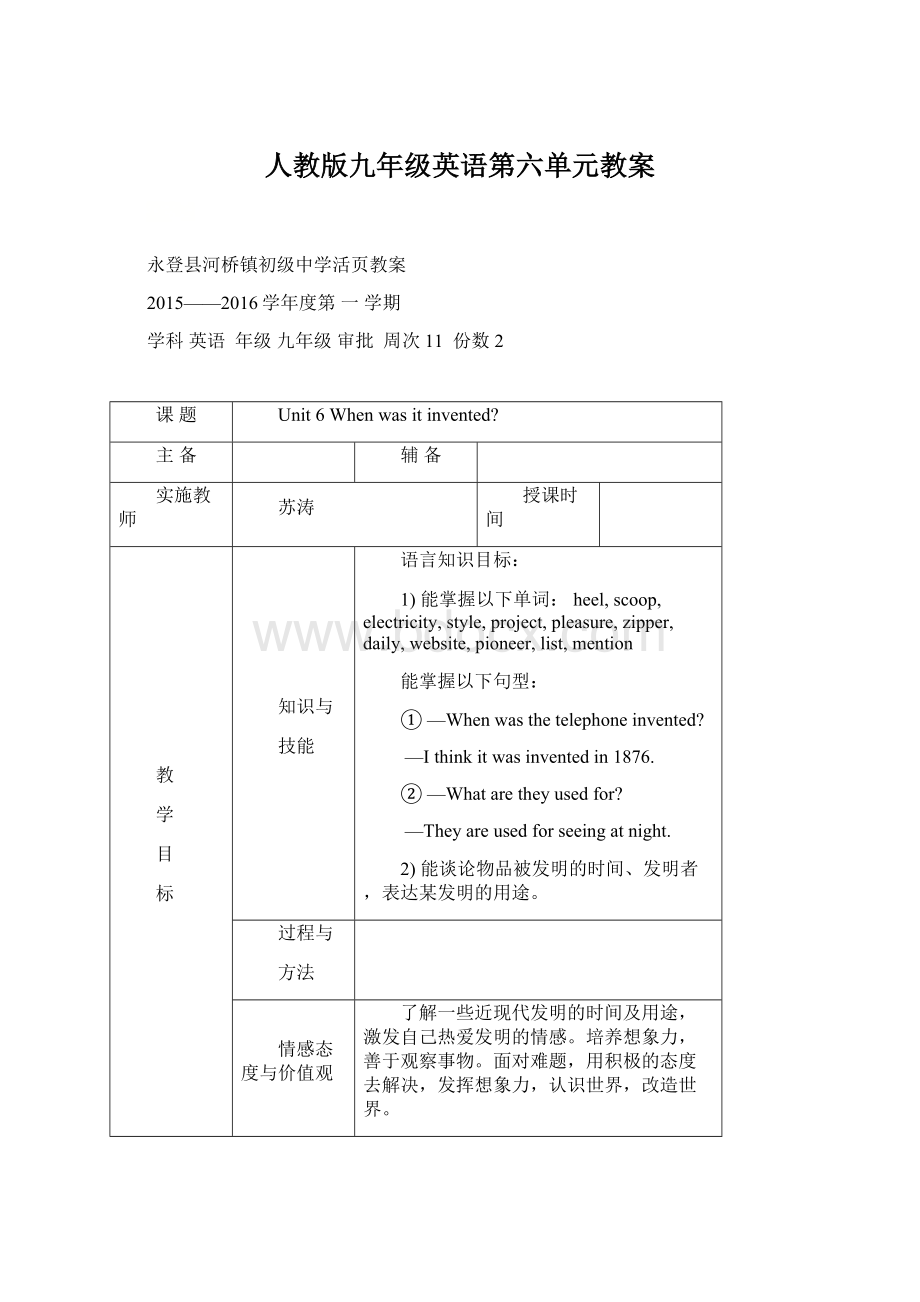人教版九年级英语第六单元教案.docx
《人教版九年级英语第六单元教案.docx》由会员分享,可在线阅读,更多相关《人教版九年级英语第六单元教案.docx(15页珍藏版)》请在冰豆网上搜索。

人教版九年级英语第六单元教案
永登县河桥镇初级中学活页教案
2015——2016学年度第一学期
学科英语年级九年级审批周次11份数2
课题
Unit6Whenwasitinvented?
主备
辅备
实施教师
苏涛
授课时间
教
学
目
标
知识与
技能
语言知识目标:
1)能掌握以下单词:
heel,scoop,electricity,style,project,pleasure,zipper,daily,website,pioneer,list,mention
能掌握以下句型:
①—Whenwasthetelephoneinvented?
—Ithinkitwasinventedin1876.
②—Whataretheyusedfor?
—Theyareusedforseeingatnight.
2)能谈论物品被发明的时间、发明者,表达某发明的用途。
过程与
方法
情感态度与价值观
了解一些近现代发明的时间及用途,激发自己热爱发明的情感。
培养想象力,善于观察事物。
面对难题,用积极的态度去解决,发挥想象力,认识世界,改造世界。
教学重点
1)本课时的单词、词组和句型,学习运用一般过去时态的被动语态。
2)学会询问发明时间及用途的基本句型:
—Whenwasthetelephoneinvented?
—Ithinkitwasinventedin1876.
—Whataretheyusedfor?
—Theyareusedforseeingatnight.
教学难点
运用一般过去时态的被动语态来讨论发明的发明时间及用途
预习要求
熟记单词、牢记各种时态的被动语态构成
学法指导
教师点拨学生小组点讨论
教学方法
小组合作学习
教具准备
PPT录音机
教学课时
5
第一课时
课题
Unit6Whenwasitinvented?
SectionA1(1a-2d)
教
学
目
标
1)能掌握以下单词:
heel,scoop,electricity,style,project,pleasure,zipper,daily,website,pioneer,list,mention
能掌握以下句型:
①—Whenwasthetelephoneinvented?
—Ithinkitwasinventedin1876.
②—Whataretheyusedfor?
—Theyareusedforseeingatnight.
2)能谈论物品被发明的时间、发明者,表达某发明的用途。
教学重点
1)本课时的单词、词组和句型,学习运用一般过去时态的被动语态。
2)学会询问发明时间及用途的基本句型:
—Whenwasthetelephoneinvented?
—Ithinkitwasinventedin1876.
—Whataretheyusedfor?
—Theyareusedforseeingatnight.
教学难点
运用一般过去时态的被动语态来讨论发明的发明时间及用途。
教学过程
教师活动
学生活动
I.Warmingup
1.展示一些近代发明的图片与近代发明的发明者,让学生们将图片与发明者相连。
T:
Doyouknowwhattheseinventionsare?
S1:
It’sacar.
S2:
It’satelephone.
S3:
It’satelevision.
T:
Doyouknowwhotheseinventorsare?
S1:
KarlBenz
S2:
AlexanderBell
S3:
J.L.Baird
LetSsmatchtheinventionsandtheinventors.
Ⅲ.Talking
1.Lookatthepicturesin1a.Discusswithyourgroup,inwhatorderdoyouthinktheywereinvented?
Trytonumberthem[1-4].
2.Ssdiscusswiththeirpartnersandnumberthepictures.
3.Talkingabouttheinventions:
A:
IthinktheTVwasinventedbeforethecar.
B:
Well,IthinktheTVwasinventedaftertheTV.
Ⅵ.Learningthenewwords&Listening
Lookatthepicturesthenlearnthenewwords.
Workon2a:
T:
TellSstheywillhearsomeinterestinginventions.
1.Lookatthepicturesin2a.Discussthethingswhattheyareusedfor.
2.PlaytherecordingfortheSstolistenandnumberthepictures.
3.Playtherecordingagaintochecktheanswers.
Workon2b:
1.LetSsreadthechartbelow.ExplainsomemainsentencesfortheSs.Makesuretheyknowwhattodo.
Role-play(2d)
1.ReadtheconversationsandLetSsreadaftertheteacher.
2.Explainsomenewwordsandmainpointsintheconversation.
3.AskSstorole-playtheconversationingroups.
引导学生们学习一般过去时态的被动语态结构。
让学生们看大屏幕的如果爱和发明者的图片,并将句子改为被动语态。
如:
T:
KarlBenzinventedthefirstcarin1885.
Thefirstcarwasinvented(byKarlBenz)in1885.
Listening(1b)
1.T:
TellSslookatthepicturesandyearsontheleft.
2.PlaytherecordingfortheSstolisten.
Ⅴ.Pairwork(1c)
1.Sstrytoremembertheinventionandtheyear.
2.StudentB,coverthedates.StudentA,askStudentBwhenthethingsinthepicturein1bwereinvented.Thenchangerolesandpracticeagain.
3.Letsomepairsaskandanswerinpairs.
Pairwork(2c)
1.TellSstomakeconversationsusingtheinformationin2b.MakeamodelfortheSs.
A:
Whataretheshoeswithspecialheelsusedfor?
B:
Theyareusedforchangingthestyleoftheshoes.
2.LetsomeSsmakeconversationsusingtheinformationin2b.
3.Seewhichgroupdoesthebest.
作业
Recitetheconversationin2d.
板书设计
Unit6Whenwasitinvented?
SectionA1(1a-2d)
beusedfordoingsth.表示“被用来做某事”。
相当于beusedtodosth.
thinkof指“考虑,记忆,记起”thinksth.over指“仔细想,审慎思考,作进一步考虑”
课后反思
第二课时
课题
SectionA2(3a-3c)
教
学
目
标
1)学习掌握下列词汇:
byaccident,ruler,boil,remain,smell,saint,national,takeplace,doubt,withoutdoubt
2)阅读短文,能按要求找到相应的信息。
3)通过阅读提高学生们的阅读能力。
4)了解茶叶被发明的历史及生产制作的简要过程。
教学重点
1)掌握本部分出现的生词和词组,达到熟练运用的目标。
2)阅读短文,获得相关的信息。
通过阅读练习,来提高阅读能力。
教学难点
1)阅读短文,获得相关的信息的能力。
2)理解并运用所学的词汇及表达方式。
教学过程
教师活动
学生活动
Ⅰ.Revision
1.Checkthehomework.
2.Role-playtheconversationin2d.
Ⅱ.Lead-in
一、播放视频《茶叶的起源》,让学生们了解中国的茶文化,及茶叶被发明的渊源,并了解其发展过程。
1.Whatisthevideoabout?
2.WhoisthewriterofChaJing?
Sstrytoanswerthequestions:
It’saboutthetea.
LuYu.
方法指导:
1先阅读所给的三句话,然后快速阅读短文,抓住每一段的主题句,找到答案。
2.学生们,按老师指导的方法进行阅读,并快速阅读三个段落。
3.最后,教师让部分学生回答答案,并校对答案。
Postreading
Readandfilltheblanks.
Filltheblanksaccordingtothefirstparagraph.
2.Filltheblanksaccordingtothesecondparagraph.
3.Fillintheblankswiththeproperforms.
Workon3c.Completethesentenceswiththecorrectformsoftheverbsinthebox.
1.告诉学生们本学习活动的要求:
用所给单词的适当形式填空。
2.让学生们读3c中的内容,理解每个句子的大体意思。
3.学生们阅读句子内容,回想短文的内容,选择恰当的单词并用其恰当形式填空。
4.如果不能直接填上,可以再去阅读短文,在相关的内容处,再仔细进行阅读,找到相关信息,并完成句子。
5.Checktheanswers。
Reading
Workon3a:
1.TellSstoreadthearticlequicklyandmatcheachparagraphwithitsmainidea.
Para.1
Para.2
Para.3
Workon3b:
1.告诉学生们再次阅读短文内容,并回答3b中的所有问题。
2.学生们先阅读这些问题,理解它们的意思,然后带着相关问题仔细回读短文,并在短文的相关信息处划线。
3.让学生们回答问题,并校对答案。
学生四人一组讨论总结文章的重难点,疏通文意,教师点拨
作业
1.Readthepassageseveraltimesafterschool.
2.Makesentenceswiththesewords:
byaccident,itisbelievedthat,takeplace,nodoubt,beusedfor,fallinto
板书设计
SectionA2(3a-3c)
1.Ifoundthekey__________(偶然)whenIwascleaningthehouse.
2.TheMay4Movement___________(发生)inBeijingin1919.
3.He’llsucceed____________(毫无疑问)thistime.
4.________(据说)ShenNongwasthefirsttodiscoverteaasadrink.
5.Tea_________________(被带到)KoreaandJapanduring6thand7thcenturies.
课后反思
第三课时
课题
SectionA3(GrammarFocus-4c)
教
学
目
标
1)学习掌握下列词汇:
fridge,low,somebody,translate,lock,earthquake,sudden,all
ofasudden,biscuit,cookie,instrument
2)进行一步复习巩固学习SectionA部分所学的生词和词组。
3)进一步学习运用一般过去时态的被动语态。
4)掌握主动语态变被动语态的方法,并通过不同方式的练习,来熟练运用。
教学重点
1)学习生词fridge,low,somebody,translate,lock,earthquake,sudden,allofasudden,biscuit,cookie,instrument
2)复习巩固SectionA部分所学的生词和词组,达到熟练运用的目标。
教学难点
1)一般过去时态的句子变为被动语态。
2)综合运用所学的知识进行练习运用。
教学过程
教师活动
学生活动
Ⅰ.Warming-upandrevision
1.Haveadictationofthenewwordslearnedinthelastclass.
2.Reviewsomemainphraseswelearnedinthelastclass.Checkthehomework.
3.LetsomeSstellsomethingabouthowteawasinventedbyaccident.
Tellsomethingabouthowteawasinventedbyaccident.
OnedayShenNongwasboilingdrinkingwateroveranopenfire.Someleavesfromateaplantfellintothewaterandremainedthereforsometime.
Itproducedanicesmellsohetastedthebrownwater.Itwasquitedeliciousandoneoftheworld’sfavoritedrinkwasinvented.
TellsomethingaboutLuYuandhisChaJing.
LuYu“thesaintoftea”mentionedShenNonginhisbookChaJing.Thebookdescribeshowteaplantsweregrownandusedtomaketea.Italsodiscusseswherethefinesttealeaveswereproducedandwhatkindsofwaterwereused.
ItisbelievedthatteawasbroughttoKoreaandJapanduring6thand7thcenturies.InEngland,teadidn’tappearuntilaround1660.TheteatradefromChinatoWesterncountriestookplaceinthe19thcentury.
一般过去时态的被动语态的构成
英语有两种语态:
主动语态和被动语态。
主动语态表示主语是动作的执行者,而被动语态则表示主语是动作的承受者。
如:
Wecleanedtheclassroomyesterday.
我们昨天打扫了教室。
(主动语态,主语we是clean这一动作的执行者)
(被动语态,主语theclassroom是clean这一动作的承受者)
一、一般过去时被动语态
一般过去时被动语态的结构为“主语+was/were+及物动词的过去分词(+by+动作的执行者).”。
1.肯定句:
主语+was/were+及物动词的过去分词+其他.
2.否定句:
主语+was/werenot+及物动词的过去分词+其他.
3.一般疑问句:
Was/Were+主语+及物动词的过去分词+其他?
Ⅱ.GrammarFocus.
学生两人一组讨论总结,并小组交流
①拉链是什么时候被发明的?
___________thezipper________?
②它于1893年被发明。
It_______________in1893.
③它是由谁发明的?
___________itinvented______?
④它是由惠特科姆•贾得森发明的。
It_________________WhitcombJudso
2.学生们根据记忆,看大屏幕来完成填空练习。
3.学生们完成填空试题后,可以打开课本检查答案,对错误的句子,单独进行强化记忆。
三、主动语态变被动语态应注意的问题
1.有些短语动词相当于及物动词,变为被动句时介词或副词不能去掉。
2.含有双宾语的主动句变为被动句时,通常把指“人”的间接宾语变为主语,指“物”的直接宾语保留不变;如果把指物”的直接宾语变为主语,则在间接宾语前加to或for。
3.主动句中感官动词see/hear/watch/feel等和使役动词make/let/have等后跟省略to
的动词不定式,变为被动语态时应加上不定式符号to。
4.系动词、不及物动词或某些短语动词(happen,takeplace,cometrue,fallasleep…)没有被动语态。
作业
Homework
补全下列主动句变被动句。
1.Jennyputherclothesinthesuitcaselastnight.
Herclothes________inthesuitcaselastnight.
2.ThetwinssanganEnglishsongthatday.
AnEnglishsong____________bythetwinsthatday.
3.Didtheybuildabridgehereayearago?
____abridge____herebythemayearago?
4.Theysoldoutthelightgreendressesyesterday.
Thelightgreendresses______________out.
板书设计
SectionA3(GrammarFocus-4c)
1)You__________tothepartylastnight,weren’tyou?
Whydidn’tyougo?
2)Theearthquakehappenedallofasudden,butluckilythevillagers__________toasafeplace.
3)Thedoor___________whenwearrived,sowe______thebell.
4)Thestudents___________nottoeatordrinkinclass,butRuby______therulewhenshestartedeatingabiscuitinscienceclass.
课后反思
第四课时
课题
SectionB1(1a-2e)
教
学
目
标
1)能掌握以下单词:
crispy,salty,sour,bymistake,customer,theOlympics,Canadian,divide,divide…into,basket,popularity,lookupto,hero,professional
2)能掌握以下句型:
①Potatochipswereinventedbymistake.
②ItisbelievedthatthefirstbasketballgameinhistorywasplayedonDecember21,1891.
③Dr.Naismithdividedthemeninhisclassintotwoteamsandtaughtthemtoplayhisnewgame.
教学重点
1)掌握本课时出现的生词及用法。
2)进行听力训练,提高综合听说能力。
3)阅读短文,获得相关信息,提高学生们的综合阅读能力。
教学难点
1)听力训练
2)阅读2b部分的短文并完成相关要求
教学过程
教师活动